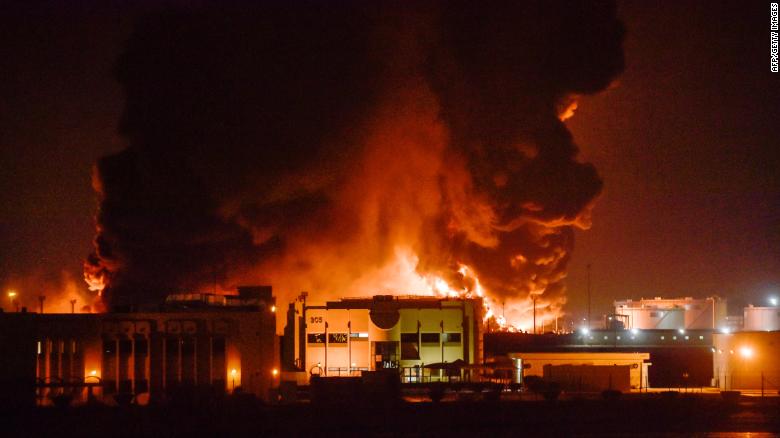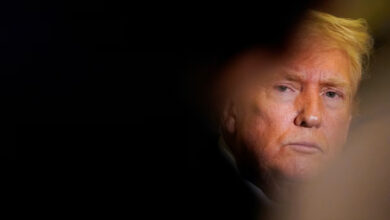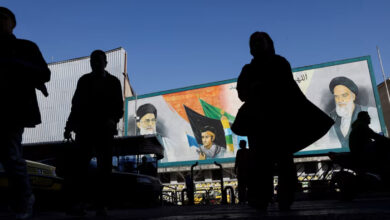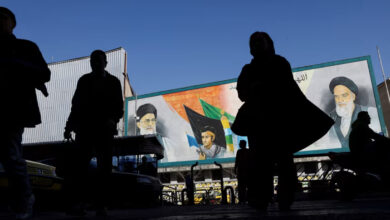
Abu Dhabi, UAE (CNN) – As Gulf Arab states lose faith in the United States’ commitment to their security, two Middle East archrivals are taking matters into their own hands.
On Monday, Iran revealed that it held a fifth round of talks with Saudi Arabia late last week. The negotiations between the two regional heavyweights were “progressive and positive,” according to an Iranian foreign ministry spokesman. Saudi Arabia is yet to comment on them.
The ministry spokesman said talks were underway on sending 40,000 Iranian pilgrims to the Hajj in the Saudi city of Mecca this year.
While talks to date have focused on relatively small issues like pilgrimage to holy sites and have been attended by officials at the intelligence level, the potential inclusion of foreign ministry-level officials in forthcoming talks could indicate significant progress and a desire to bring to a conclusion some of the region’s most intractable conflicts.
Riyadh severed ties with Tehran in 2016 after Iranian protesters stormed the Saudi embassy in the Iranian capital following the execution of a Shi’ite cleric in Saudi Arabia.
Frustrated with what they see as the US’ waning interest in their security concerns, Gulf Arab states have begun taking matters into their own hands of late, reaching out to rivals and enemies to fend off conflicts that can wreak havoc on their economies.
Oil facilities in both Saudi Arabia and the United Arab Emirates have come under attack in recent years by actors believed to be backed by Iran, including Yemen’s Houthi rebels. In both cases, the Gulf states were underwhelmed by the US response, prompting a rethink of a longstanding pillar of the US-Gulf relationship that ensured Arab consideration for US’ energy needs in return for American guarantees of security.
The US has reiterated its commitment to Gulf security by bolstering regional defenses against missile attacks. President Biden on Friday picked career diplomat Michael Ratney as the next US ambassador to Riyadh. If confirmed, he would be the first career diplomat to hold the post in the country in three decades.
The clearest manifestation of this rethink was the Gulf states’ muted reaction to the war in Ukraine. The US allies haven’t wholeheartedly come out in support of the Biden administration’s position on Russia’s war there, and regional officials have pointed to the conflict as a sign of a changing world order where the West may have less say than it once did..
Saudi Arabia, the world’s top oil exporter, and the UAE have rebuffed US calls to increase oil production to lower the price of crude that is fueling Russia’s war, opting instead to stick to an alliance with fellow exporter Russia to ramp up production gradually. More than 15 months into his presidency, Joe Biden and the de facto Saudi ruler crown prince Mohammed bin Salman are yet to speak to each other.
Meanwhile, both the UAE and Saudi Arabia have been mending fences in the region.
Over the past two weeks, Saudi Arabia has de-escalated its war in Yemen through a rare truce and begun a rapprochement with Lebanon after an unprecedented rupture of ties last year. Both countries are arenas for proxy conflicts between Riyadh and Tehran.
The biggest obstacle to warming ties from an Iranian perspective was the war in Yemen, said Mohammad Marandi, a professor at Tehran University. “Now that that is halted, at least for the time being, there is real hope for improvement,” he said, adding that Iran was only prepared to discuss matters of a bilateral nature and not “negotiate on behalf of” Yemen’s Houthi rebels
The resumption of talks also occurs as negotiations between world powers and Iran to revive the 2015 nuclear agreement reach an advanced stage. Gulf Arabs have been frustrated at the US for not addressing their concerns with Iran in the talks, believing their influence on Tehran pales in comparison to the leverage the US wields.
“The Gulf states believe that the US should be present at the table for Iran to deliver on any promises made to them,” said Elham Fakhro, associate fellow at London’s Chatham House think tank. But the Biden administration has insisted that those talks be held separately between Iran and the Gulf states, she added.
Direct talks with Iran are an attempt by Gulf Arab states to do just that, but analysts doubt their ability to achieve results that can satisfy both parties.
“These talks are almost doomed for failure,” said Mohammed Alyahya, a fellow at the Hudson Institute. “At its core, the problem is not one between Iran and Saudi Arabia, it is between Iran and the US. Iran attacks the kingdom because it perceives it to be a client state of an American imperial order.”
But Seyed Hossein Mousavian, a former Iranian nuclear negotiator and Princeton University professor, said that both states have enough leverage over each other to warrant talks.
“The key issue for both is mutual assurance on no hegemonic regional agenda” and security guarantees, he said. Saudi Arabia has the US’ backing and “Iran has huge grassroots influence in the regional countries which can be a long-term threat for Saudis,” he said.
But it’s that US backing that has come into question of late. Disgruntlement with the US in the Gulf runs so deep that some see Washington’s role in the region as a spoiler rather than a guarantor of stability.
“Gulf states see America’s appeasement policy towards Iran over the past decade to be responsible for Iran ramping up its aggression,” said Alyahya, adding that the policy has started “fires that may spread to our house.”
“When a pyromaniac comes to your home, that is dangerous. What is more terrifying is when the pyromaniac comes dressed as a fireman,” he said, referring to US policy on Iran.




